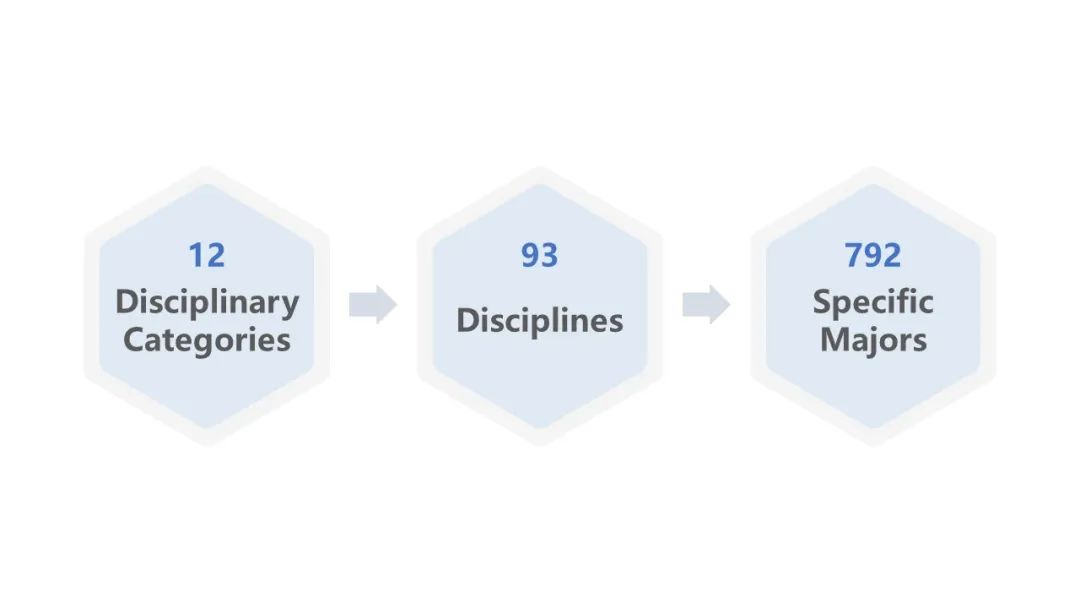How to identify the best options for career prospects among 792 university majors?

By Jiang Yuan
As more young people enter the workforce, how should they choose their majors to prepare for their future careers? What is the relationship between major selection and career development?
Major selection is only the first step toward wider career development, and as such the career prospects of a major should be viewed from a dynamic development perspective. Moreover, the alignment of values between organisations and individuals, and the compatibility between individual abilities and job demands, are both highly related to one’s career success.
Should we prioritise interests, or something else?
Let’s look at the current selection of majors currently provided in Chinese universities. According to recent data released by the Ministry of Education, as of April 2023, China’s undergraduate majors are divided into 12 disciplinary categories encompassing 93 disciplines and a total of 792 specific majors.
How can students choose from 792 majors, while also taking a university’s ranking and geographical location into consideration?

Statistical surveys show that of 11 chosen factors influencing students’ choice of majors, the top four are personal interest, employment outlook, career development potential, and the individuals’ skills in a specific discipline. This highlights that students value both their innate interests and their employment prospects when choosing a major.
Parent and family preference also significantly shape students’ major selection. In the traditional Chinese value system, the pursuit of higher education by the younger generation is not just the business of the individual but also a matter of great importance for the whole family, as one’s professional choice is closely linked to the future of the family.
Academic research has found different family backgrounds may influence differences in major selection among Chinese and American university students, due to distinct mechanisms of major selection and college student financial aid systems. In China, students choose their major before enrollment, and different majors may attract varying numbers of applicants due to disparities in their expected returns. Additionally, Chinese students may tend to consider household income when choosing a major due to the under-developed college student financial aid system in China. On the other hand, it is relatively easy for American students to change majors after enrolling, and the government provides financial aid programs such as education loans that students can apply for and gradually repay after entering the workforce. As a result, the influence of family on their choice of major is relatively less significant.
Another interesting phenomenon among Chinese college students is that while personal interest is important for both male and female students, the genders have different views towards future job opportunities. For example, female students tend to value the employment prospects associated with their major more than their male counterparts; they are also more likely to be influenced by the opinions of those around them. Psychological studies suggest that, under the influence of family, school, and social culture, female Chinese students tend to exhibit a stronger reliance on family and authority figures such as teachers, while men tend to display greater independence.
What are your career interests?
For high school students that are in a stage of innocence and continuous physical and mental growth, identifying interests and selecting a suitable major is an essential step toward their future professional development. However, is their perceived interest truly their genuine passion? Are they sufficiently prepared psychologically for a future career related to their major?
According to Self-Directed Search (SDS), a career assessment and exploration tool based on a theory developed by American psychologist John Holland, both people and work environments can be classified according to six basic types: Realistic, Investigative, Artistic, Social, Enterprising, and Conventional. These categories are known collectively as RIASEC.
Based on vocational personality theory, Holland developed a career interest test inventory, which consists of four sections. The first section involves listing one’s ideal professions. The second section assesses the four aspects of activities, potentials, occupational preferences, and self-evaluation of one’s ability. The third part establishes a three-letter career code in descending order of scores obtained from the aforementioned four aspects. Finally, the fourth section is a career search table, which includes 1,335 occupations, each marked with a career code and the required educational level. Taken together, through systematic assessment and analysis, individuals can identify career types that suit their own characteristics.
Career outlook of a major
In addition to personal interest, factors related to job prospects and career growth are also key considerations for university students when selecting their majors. For female students, in particular, job opportunities are even more important than their personal interests. This leads us to the following questions: what is the current employment environment like, and what can you expect after graduation if you avoid career-related considerations?
Firstly, the proliferation of higher education (i.e. the expansion of universities) has led to a decline in employment rates. In 2023, the number of Chinese university graduates reached a record high of 11.58 million, and there remains a significant structural contradiction between labor shortages and recruitment difficulties. Data from the National Bureau of Statistics unveiled that in June, the surveyed unemployment rate amongst the labor force aged 16-24 was 21.3%, the highest it registered since 2018.
Second, some majors are favoured and some are not. The 2023 China Undergraduate Employment Report published by the MyCOS Research Institute revealed that information engineering, electrical engineering and automation, and software engineering are seen as well-regarded, "green card" majors by potential employers, whereas painting, law, applied psychology, and music performance are among the less-valued "red card" majors. Notably, painting, law, and applied psychology have been marked as “red card” undergraduate disciplines for five consecutive years.
After taking a closer look at recent undergraduate employment reports, it’s clear that majors related to engineering tend to result in higher employment rates, salary, and job satisfaction, while art-related majors are highly represented among “red-card” disciplines due to their low employment rate and low salary.
Finally, university students are inclined to secure a stable job. The national civil service exam, commonly known as the “Guokao,” has expanded its admission for four consecutive years, leading to more undergraduates cramming to get a highly sought-after occupation in the field. Relevant data shows that the number of undergraduates preparing for civil service and public sector recruitment exams has doubled compared to that of 2018. The report also finds that an increasing number of graduates studying in non-native provinces (“non-source provinces”) are returning to their hometowns in the six months after graduation to seek employment. Specifically, 47% of the 2022 cohort graduates who studied in non-native provinces returned to their hometowns for employment, up 4 percentage points compared with 2018 cohort (43%).
In conclusion, though the overall employment situation of university graduates is generally stable, it is undeniable that fresh graduates do face certain difficult challenges.
Selecting a major is not a one-off decision
Selecting a major is just the beginning of any student’s journey towards a career. Once they enter university, exploring career options related to their major is even more critical for their life’s development.
Career exploration requires prospective students to view the career prospects of their major with a dynamic perspective. In reality, market demands have changed the needs and positioning of graduates. According to a survey from recruitment portal 51job this year, employers are offering graduates more job opportunities in the product and technology R&D sectors, rather than in previously dominant sales roles.
Undergraduate education is a process of continuously understanding your chosen major. During their studies, students may discover a mismatch between their personal interests and their chosen majors, a low or undesirable job outlook of their majors, or a skill gap that hinders their academic performance. In such circumstances, prompt changes are necessary. This reevaluation, based on academic learning and practical exposure (such as internships), is likely to be more effective.
The right match between individuals and positions is also important in the workplace. While the impact of different majors on a graduate’s employment is significant, it's not the sole factor. Past research has found that college students' job matching is not only related to their majors, but also to their genders and school levels. Moreover, the match between an individual's values and the organisation's values, as well as the match between a person's abilities and their job, are both significantly related to an employee's career growth.
Therefore, college students need to not only understand their abilities and interests when choosing a major, but also be aware of how their majors will fit into their future career in an organisation, and therefore improve themselves based on their ideal job positions in the future. Only when undergraduates spend time during their university years preparing themselves to step out of their ivory tower can they secure themselves a better chance to find a job that suits their preferences and showcases their professional talents.
Jiang Yuan is an Associate Professor of Management at CEIBS. For more on his teaching and research interests, please visit his faculty profile here.









